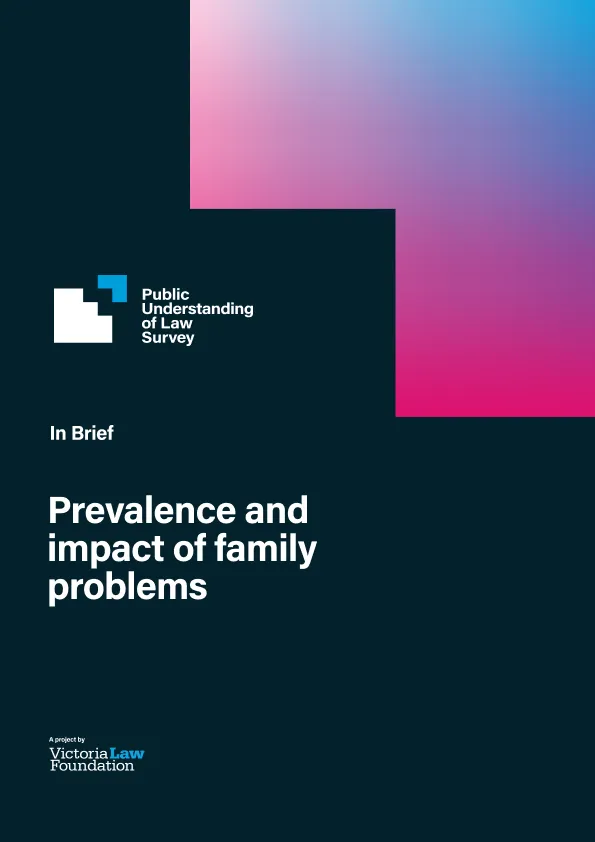How Victorians experience and resolve their family problems
Our companion PULS In brief publications reveal that family problems, though less common, are Victoria’s most damaging legal issues with the highest unmet need.

Prevalence and impact of family problems and Resolution and outcomes of family problems investigate how Victorians experience and resolve their family problems, drawing on data from the Public Understanding of Law Survey (PULS).
While less common than other legal issues, we found that family problems are the most severe, carrying heavy personal and social costs. They disproportionately affect Aboriginal and Torres Strait Islander people, single parents, people in financial distress, and those with disability or mental distress. Despite high levels of service use, family problems remain the greatest source of unmet legal need, with long-lasting impacts and widespread dissatisfaction with outcomes.
In this short video, publication author Yolanda Mansfield discusses the findings with VLF Senior Researcher Dr Bethia Burgess.
Key findings
- Disproportionate impact: Family problems are not the most common legal issue, but they are the most severe, with an average severity of 7.7/10. One in three family problems rated at maximum severity (10).
- High emotional and social cost: 95% of people experiencing family problems report stress, 79% see family relationships damaged, and over half face harassment, threats, or assault.
- Deep links to disadvantage: Aboriginal and Torres Strait Islander people, single parents, those in financial distress, and people with disability or mental distress are significantly more likely to experience family problems.
- Interconnected challenges: Three-quarters of those with a family problem have multiple legal issues, often spanning housing, debt, government payments, and consumer problems.
- Higher unmet legal need, longer problem duration: While family problems had the highest rate of being seen as legal (58%) and use of legal services (63%), they still resulted in the highest level of unmet legal need and longest problem duration out of all problem types examined in the PULS.
- Distinct unhappiness: More than half of those experiencing family problems were not happy with the progress or outcome of their problem.
- Urgent need for targeted response: Without early intervention, family problems can entrench disadvantage, escalate into other legal and social problems, and cause long-term harm.
What next?
While people are more likely to recognise their family problem as legal and make use of legal services, problems consistently take more time to resolve and result in lower perception of outcome fairness and higher unmet legal need.
Timely, targeted, and fair resolution processes are critical to preventing escalation and breaking cycles of disadvantage. This means:
- timely, affordable, and accessible legal help that prioritises resolution before problems escalate
- integrated legal and social support to address underlying causes, from housing insecurity to financial stress
- proactive outreach to high-risk groups, ensuring services meet people where they are
- systems change to streamline processes, remove barriers, and promote fair, just, and sustainable outcomes.
Frequently asked questions
What kinds of 'family problems' were included in the analysis?
The research looked at family problems with a legal dimension including:
- division of money or property following divorce or separation
- spouse or partner maintenance
- child support payments
- custody, residence, access or contact issues concerning a child under 18
- a care protection order or assessment by a child welfare authority
- fostering, adoption or legal guardianship
- a power of attorney
- a Will or deceased estate
- a family member or partner controlling or exploiting your money, financial information or assets
- other problems not covered above related to family matters.
These were grouped together as ‘family problems’ for the purposes of analysis.
How can I use this research?
The companion In briefs provide data-based evidence that can help services, researchers, and policymakers understand the prevalence, impact, and resolution of family problems in Victoria. They can be used to inform service design, identify unmet need, support advocacy, and guide further research into access to justice.
What is the Public Understanding of Law Survey (PULS), and how was it conducted?
The Public Understanding of Law Survey (PULS) is a global first, large-scale face-to-face survey into how Victorians understand, experience, and navigate everyday legal issues. It was conducted through interviews with a probability sample of Victorians, asking about a wide range of common problems with a legal dimension, from consumer issues to employment, housing, and family matters.
How many Victorians participated in the survey, and how representative are the findings?
Using probability sampling, 6,008 adults were selected across Victoria to take part in the PULS. The large number of survey respondents gives us scope to explore the data in a wide variety of ways, with the ability to look at individual problems or social and demographic groups in detail.
Probability sampling ensures that every adult Victorian living at a residential address had the chance to be included in our sample, allowing us to generalise the findings to Victoria as a whole.
Where can I learn more about PULS and relevant publications?
You can find our PULS reports, the dataset, and related publications on our website, alongside resources that explain the methodology and key findings in more detail.
New research reveals how disadvantage compounds legal problems
Our latest research uncovers critical insights into how disadvantage shapes the experience and resolution of legal problems in Victoria.
Downloads
Exploring the prevalence and impact of Victorian's experience of family problems.

Exploring the resolution and outcomes of Victorian's experience of family problems.

Resources
Related topics
Explore our range of publications investigating the experience of young people and the law.

Explore our range of publications investigating the experience of young people and the law.
What we know now about legal need, capability and multiple disadvantage.

What we know now about legal need, capability and multiple disadvantage.
New research reveals how disadvantage compounds legal problems
Our latest research uncovers critical insights into how disadvantage shapes the experience and resolution of legal problems in Victoria.